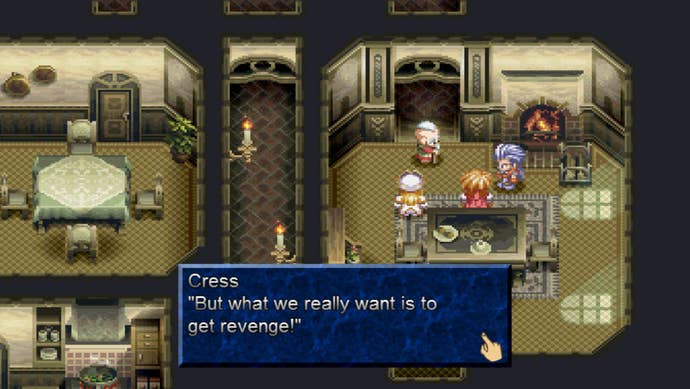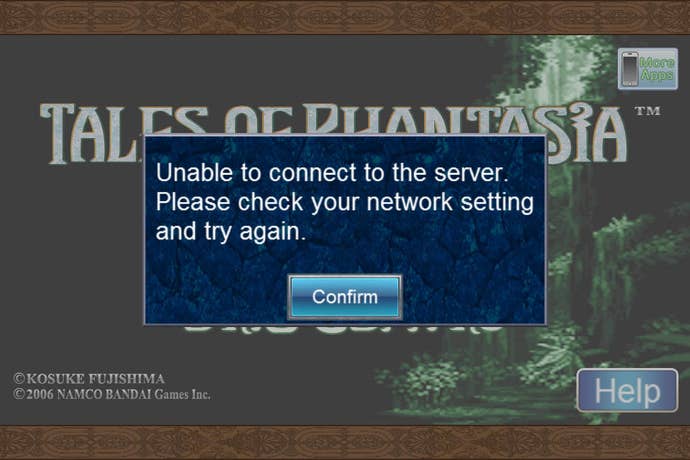Tales of Phantasia Mobile, and Other Infuriating "Free" Rip-Offs
"Free" games like Tales of Phantasia for mobile are damaging a monetization formula that, believe it or not, actually has some value.
This article first appeared on USgamer, a partner publication of VG247. Some content, such as this article, has been migrated to VG247 for posterity after USgamer's closure - but it has not been edited or further vetted by the VG247 team.
The games industry has become a weird place. Telephones have become a viable game platform; video game retail is giving way to digital marketplaces; and the words "Free Game!" make us bristle with suspicion.
Rightfully so, too. "Free-to-play" games can indeed be downloaded for no cost, but once you open the app, it's usually only a matter of time before you hit the dreaded paywall. How long can you keep playing until you're suddenly expected to endure waits of 24 hours just to erect a single building? How long do you have to sit back and chill until your army is "ready" to take on another foe? Every free-to-play game supplies a different answer, and tests your tolerance in different ways. It's like a game within a game. What fun.
Despite the hate heaped upon the free-to-play formula, it can be implemented fairly and successfully, thereby providing cash-strapped game players with good times. Unfortunately, when a company as large as Namco Bandai tries to jam the formula into a traditional role-playing game like Tales of Phantasia, the product is an ugly wreck that destroys players' confidence in free-to-play games -- and the reputation of a classic RPG along with it.
Tales of a Train Wreck

Tales of Phantasia was originally released for the Super Famicom in 1995. The mobile version of the game is actually a port of a PSP re-release that hit Japan in 2006.
The game tells the story of Cless (or Cress, depending on your preferred translation), a young boy who's orphaned after bad guys raze his village in search of an item his father bestowed upon him at The Last Minute ™. Cless swears revenge, and on his journey to put the hurt on evil, he recruits party members and does a little time-travelling on the side.
Tales of Phantasia is renowned for its battle system, which takes place on a 2D field and combines action with typical menu-based RPG commands. Players dart into the fray, attack, then attempt to get out of enemy range.
Victory brings money ("gald") that can go back into items, better equipment, and other necessities for taking on tougher challenges, like bosses.
Now, for a cookie and a hug: How can a 16-bit RPG utilize the free-to-play formula without having the whole experience collapse into a bruised, enraging mess?
Defeat the Ultimate Evil for Two Bucks and Change

Answer: It can't.
Within minutes of starting Tales of Phantasia for mobile, it becomes obvious someone at Namco Bandai grinned and rubbed their hands together as they devised the game's menu of in-app purchases. Worse, the ways in which Tales of Phantasia mobile goads you into making purchases is so shameless, you might find yourself rising from your seat while shouting in stunned disbelief.
Item drops, like healing fruit gels that restore hit points and magic points, have been scaled back. Oh, but you might get lucky and log into the game while the server is offering "increased item drops," you lucky dog. Yes, "log into the game." In order to play this 20-year-old RPG, you need to have a constant Internet connection.
In addition to a crummy item drop rate, Tales of Phantasia mobile upped the cost of armor and weapons compared to previous installments of the game, jacked up enemy difficulty, made bosses stupidly hard -- and, just to twist a red-hot rapier into the player's eye, it took away save points situated near said bosses.
Why would Namco Bandai do these mean things do a beautiful old adventure? The answer is the Miracle Orb, an expendable item that sells for $1.99 each in the in-game store. When you fall in battle, the Miracle Orb will resurrect you and apply some status buffs. If, however, you die again, or if you fall in another battle, you'd better cough up another $1.99 for another Orb.
Don't want to spend more money? Enjoy your trip back to your last save point and all the lost progress that comes with it.
To be fair, it's true that you can technically get through Tales of Phantasia without spending a dime. In-app purchases are optional. So is grinding. So is fun. It's enough to make you want to do a little time traveling of your own and put an axe in the free-to-play formula before it can gestate into the ugliness that currently dominates the App Store and Google Play.
Free-To-Play Done Right (It Is Possible)

There are two major problems with how Tales of Phantasia mobile is monetized.
First, even though several iterations of Tales of Phantasia have been released over the years in Japan, the only official English adaptations it's seen comprise the mobile game and a 2006 port for the Game Boy Advance. By turning Tales of Phantasia into a farm for in-app purchases, Namco Bandai is effectively turning newcomers away from a great game. The company is also kicking dirt at players who've come to know the game through fan translations and would love to support an official English version of Tales of Phantasia.
Second, there are excellent free-to-play games that feature fair in-app purchases, but as long as giants like Namco Bandai and EA (hello, Dungeon Keeper) exploit the platform until it's as trustworthy as a rickety footbridge, players will continue to rebel against all things "free." That's a shame, considering smaller studios rely on cheap and free games to reach as many users as possible.
NimbleBit is an example of a studio that usually manages to show players a good time with its free games. In Tiny Tower, for instance, the game's purchasable hard currency -- "Bux" -- can be earned by the player if they stick around and operate the elevator that ferries tower residents and guests from floor to floor. In turn, Bux can be used to speed up construction projects and buy faster elevators.
Don't feel like operating the elevator? No problem. Put the game down for a bit and do something else. By the time you come back, the construction on your new floor will probably be done, and your stores will need to be re-stocked. Either way, it's nice to have the option to be rewarded for pushing a few buttons.
Hunter Island by NTT Resonant is another example of a mobile game that does in-app purchases right. For 99 cents, you get a high-quality Pokémon-style game that features interesting locales, neat monsters (called Arkadions), and the ability to fight online with other players. The game's best Arkadions are admittedly easier to capture or hatch if you have a decent supply of gold (Hunter Island's purchasable hard currency), but gold is easily earned by completing quests and other tasks. Likewise, we have Path of Exile and Puzzle & Dragons as examples of ethical microtransactions. It can be done, so why aren't the big studios willing to keep their dealings clean?
Free-To-Frustrate

Unfortunately, thanks to games like Tales of Phantasia mobile, people dig their heels in and shake their heads when you even try to recommend good free-to-play games made by studios that aren't interested in ripping people off. The formula's reputation resembles a clear-cut forest; it's been stripped down to dirt, and comparatively little of value has been put back in.
Is there a chance for repair? Maybe, but it would involve all game publishers -- large game publishers in particular -- using free-to-play fairly and responsibly. Meaning no more blatant, insulting cash grabs like what we've seen with Tales of Phantasia mobile and Dungeon Keeper. You probably shouldn't hold your breath.

